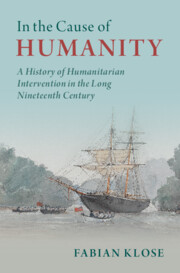Book contents
- In the Cause of Humanity
- Human Rights in History
- In the Cause of Humanity
- Copyright page
- Contents
- Acknowledgements
- Abbreviations
- Introduction
- Part I Interventionism and Humanitarianism under the Sign of Internationalism
- Part II The Struggle against the Atlantic Slave Trade and the Emergence of a Humanitarian Understanding of Intervention
- Part III Humanitarian Intervention and Its Solidification as an Imperial and Colonial Practice
- Notes
- Bibliography
- Index
Introduction
Published online by Cambridge University Press: 25 November 2021
- In the Cause of Humanity
- Human Rights in History
- In the Cause of Humanity
- Copyright page
- Contents
- Acknowledgements
- Abbreviations
- Introduction
- Part I Interventionism and Humanitarianism under the Sign of Internationalism
- Part II The Struggle against the Atlantic Slave Trade and the Emergence of a Humanitarian Understanding of Intervention
- Part III Humanitarian Intervention and Its Solidification as an Imperial and Colonial Practice
- Notes
- Bibliography
- Index
Summary
In the year 2000, to coincide with the turn of the millennium, Kofi Annan, the then secretary-general of the United Nations, released a report in which he discussed at length the role of the UN and the challenges faced by the organisation in the twenty-first century.2 Annan’s detailed reflections extended from questions of globalisation, peacekeeping, the global struggle to overcome poverty, and long-term environmental and climate protection to the structural reform of the UN and its various agencies and sub-organisations. They were intended as proposals to the member states of the UN ahead of its millennium summit, at which joint solutions to pressing problems both present and future were to be discussed. A central concern of Annan’s was the propagation of universal human rights, and he accordingly pushed to bolster the international protection mechanisms already in place. His proposed strategies not only included the establishment of the International Criminal Court and the general strengthening of international humanitarian law, but also implied the concept of humanitarian intervention – the direct intervention, ultimately backed up by force, in the internal affairs of a sovereign state for the purpose of protecting humanitarian norms.3
- Type
- Chapter
- Information
- In the Cause of HumanityA History of Humanitarian Intervention in the Long Nineteenth Century, pp. 1 - 18Publisher: Cambridge University PressPrint publication year: 2021

